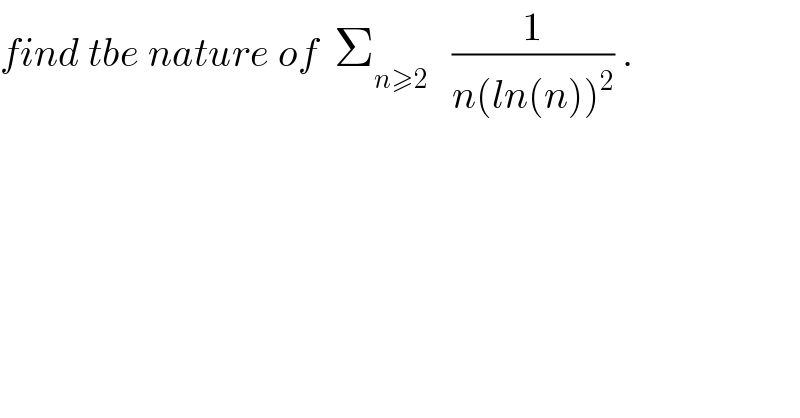
Question Number 32298 by abdo imad last updated on 22/Mar/18

$${find}\:{tbe}\:{nature}\:{of}\:\:\sum_{{n}\geqslant\mathrm{2}} \:\:\:\frac{\mathrm{1}}{{n}\left({ln}\left({n}\right)\right)^{\mathrm{2}} }\:. \\ $$
Commented by abdo imad last updated on 01/Apr/18

$$\:{let}\:{put}\:\varphi\left({t}\right)\:=\:\frac{\mathrm{1}}{{t}\left({lnt}\right)^{\mathrm{2}} }\:{with}\:{t}\geqslant\mathrm{2}\:\:{we}\:{have} \\ $$$$\varphi^{'} \left({t}\right)\:=\:−\frac{\left({t}\left({lnt}\right)^{\mathrm{2}} \right)^{'} }{{t}^{\mathrm{2}} \left({lnt}\right)^{\mathrm{4}} }\:\:=−\frac{\left({lnt}\right)^{\mathrm{2}} \:+\mathrm{2}{lnt}}{{t}^{\mathrm{2}} \left({lnt}\right)^{\mathrm{4}} }\:<\mathrm{0}\:\varphi\:{is}\:{decreasing}\:{so} \\ $$$${the}\:{serie}\:{have}\:{tbe}\:{same}\:{naturewith}\:\int_{\mathrm{2}} ^{+\infty} \:\:\frac{{dt}}{{t}\left({lnt}\right)^{\mathrm{2}} }\:{dt} \\ $$$${ch}.\:{lnt}\:={x}\:{give}\: \\ $$$$\int_{\mathrm{2}} ^{+\infty} \:\:\:\frac{{dt}}{{t}\left({lnt}\right)^{\mathrm{2}} }\:{dt}\:\:=\:\int_{\mathrm{2}} ^{+\infty} \:\:\frac{{e}^{{x}} {dx}}{{x}^{\mathrm{2}} {e}^{{x}} }\:\:=\:\int_{\mathrm{2}} ^{+\infty} \:\:\frac{{dx}}{{x}^{\mathrm{2}} }\:{and}\:{this}\:{integral} \\ $$$${is}\:{convergent}\:{so}\:{the}\:{serie}\:{is}\:{convergent}. \\ $$
